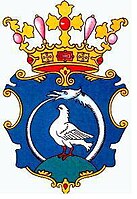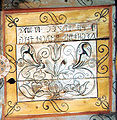Unitarian Church of Transylvania
| Unitarian Church of Transylvania | |
|---|---|
 Official insignia of the Unitarian Church of Transylvania | |
| Type | Nontrinitarian Christianity |
| Classification | Radical Protestant |
| Orientation | Unitarianism |
| Theology | Summa Universae Theologiae Christianae secundum Unitarios |
| Polity | Quasi-episcopal |
| Bishop | Rev. István Kovács |
| Associations | International Council of Unitarians and Universalists, European Liberal Protestant Network |
| Region | Romania, Hungary |
| Language | Hungarian |
| Headquarters | Unitarian Church, Cluj-Napoca, Romania |
| Founder | Ferenc Dávid;[1] |
| Origin | 1568 |
| Separated from | Hungarian Reformed Church |
| Members | 60,000 in Romania 25,000 in Hungary |
| Places of worship | 125 in Romania 12 in Hungary |
| Secondary schools | 2 |
| Tertiary institutions | Protestant Theological Institute of Cluj |
| Other name(s) | Hungarian Unitarian Church |
| Official website | www.unitarius.org |
The Unitarian Church of Transylvania (
The Transylvanian and Hungarian Unitarians represent the only branch of Unitarianism not to have adopted a
Together with the Calvinist
Demographics

According to the results of the 2002 census, there are 66,846 Romanian citizens of the Unitarian faith (0.3% of the total population).
The vast majority of church adherents live in Transylvania, mostly between
History

The Unitarian Church was first recognized by the
The Church attracted suspicion from all other established religions,
Following the Union of Transylvania with Romania at the end of World War I, Unitarian congregations were established in regions of the Old Kingdom: the first Unitarian church in Bucharest was founded in 1933 (its building was later demolished).[4] During World War II, when Hungary ruled Northern Transylvania, the church, to prove its devotion to the official state ideology, engaged in anti-Semitic activity, despite having previously accepted many converts of Jewish origin.[8]
American and British Unitarians became aware of the survival of the Unitarian Church in Transylvania following the visit of
In 2016, the deputy bishop announced his support for same-sex marriage.[10] In 2018, the governing body of the church voted to only bless marriages recognized by the state, presently only heterosexual marriages, but did vote to allow individual members to express their own opinions on marriage.[11]
Churches
The locality of Dârjiu is home to a 13th-century
-
The Unitarian Church in Brașov
-
Ceiling of the Unitarian Church inInlăceni, with a statement rendered in Old Hungarian script
-
The Unitarian Church in Șimonești
-
The Unitarian Church in Târnăveni
-
The Unitarian Church in Târgu Mureș
See also
References
- ^ ISBN 978-0-943549-83-5.
- ISBN 9781476794679.
- ^ ISBN 0-334-02883-3
- ^ a b c d e f g (in Romanian) Marius Vasileanu, "Cultele din România: Biserica Unitariană", in Adevărul, May 25, 2006 (hosted by Hotnews.ro); retrieved July 27, 2007
- ^ (in Romanian) Recensământ 2002. Rezultate: Populaţia după religie la recensământul din 2002 Archived March 25, 2008, at the Wayback Machine; retrieved July 27, 2007
- ISBN 90-272-1858-7
- ^ ISBN 0-8223-1241-7
- ISBN 9781498551229
- ^ ISBN 90-232-3685-8
- ^ "Unitarian leader takes Equal Marriage stand in Romania". UUA International. 2016-02-09. Retrieved 2016-05-29.
- ^ "Hungarian Unitarian Church votes to support only male-female marriages". UU World Magazine. 2017-11-13. Retrieved 2018-10-22.








